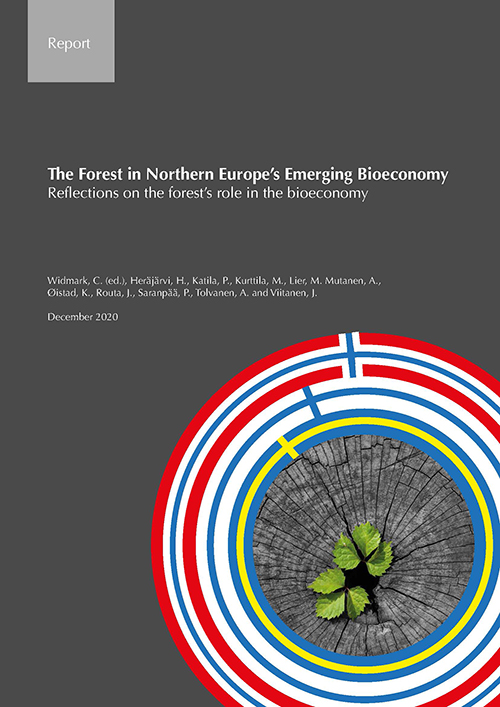Reflections on the forest’s role in the bioeconomy
The Forest in Northern Europe’s Emerging Bioeconomy
The forests in Nordic countries have been a source of food, products and welfare for both local communities and for the nations as long as there has been any settlement. More recently, the way the forest supports the climate has become more pronounced. However, humans now face major challenges due to climate change as well as societal and environmental challenges. Fundamental changes are needed to ensure future prosperity in the face of growing resource depletion, climate changes and environmental degradation. What has become clear is that fossil dependence must be overcome and be replaced with bio-based materials and innovations to support the more efficient use of resources — thus, creating a more bioeconomy-based society.
 This report describes the role of the forest in bioeconomy transformation and green innovation in the northern part of Europe — Finland, Norway and Sweden — and highlights the challenges facing forests in this emerging bioeconomy. These countries are also part of the Barents area, thus the northern part of Finland, Norway, Sweden and Russia. In summary, the report discusses several common features and lessons learned from these countries:
This report describes the role of the forest in bioeconomy transformation and green innovation in the northern part of Europe — Finland, Norway and Sweden — and highlights the challenges facing forests in this emerging bioeconomy. These countries are also part of the Barents area, thus the northern part of Finland, Norway, Sweden and Russia. In summary, the report discusses several common features and lessons learned from these countries:
- – Forests are crucial for the development of sustainable bioeconomy in the Nordic countries in substituting fossil fuel-based materials and energy. Forest biomass has a large potential for developing new bio-based products.
- – Bioeconomy and circular economy transformation depend on both technical and social innovations together with societies adapting to a bio-based sustainable future, which emphasises the ecologic, economic, and social functions of forests. In policymaking and forest management, synergies need to be realised and trade-offs evaluated and addressed in forest management in general.
- – Bioeconomy transformation is driven by the development of forest value chains and innovations based on forest biomass, in which research and development go hand in hand with investments and policy regulations.
- – Consumers are a main driver of bioeconomy transformation replacing the demand of fossil-based materials with bio-based.
- – Choices, both in policy and forest management, have to be made to support the continuous provision of all forest ecosystem services.
- – The contributions of forest to bioeconomy are regional, national, as well as cross-country (e.g. Baltic, Barents or Nordic), and international (e.g. EU) and the forest’s contribution to bioeconomy has to be considered in relation to properties of the forest, sustainability, innovations, knowledge development, green investment structures as well as national policies.
Read the report “The Forest in Northern Europe’s Emerging Bioeconomy – Reflections on the forest’s role in the bioeconomy”
Watch the report being presented at the Barents Forest Forum 2021.
The initiative of the report springs from the Barents Forest Sector Network, now Working Group on Barents Forest Sector (WG BFS) of the Barents Euro-Artic Council (BEAC). The report has been financed by the Swedish Government via the Swedish National Forest Programme. The Swedish University of Agricultural Sciences (SLU) and the EFI Forest Bioeconomy Network lead the development of the report.
A working group consisting of experts from Finland, Norway and Sweden has developed the report. The views expressed in this publication are those of the authors. The development of the report started during a workshop at the Barents Forest Forum (in Umeå – Sweden, 2019), and a number of workshops was further planned. However, as the Covid-19 pandemic developed in 2020, shorter workshops and discussions were carried out via online meetings. It is based upon published research papers, grey literature, official statistics, and reports.
The authors acknowledge the kind support by the Swedish Forest Agency, and especially thank the Steering group of the Barents Forest Forum for support and engagement during the process of developing the report.
The editor, Camilla Widmark, also appreciates the input and collaboration with the writing team. Further, the report has also benefited from the assistance of intern Aemiro Melkamu Daniel (SLU) and Prof. Peichen Gong (SLU), who have provided helpful comments and helped in developing background material for this report.

